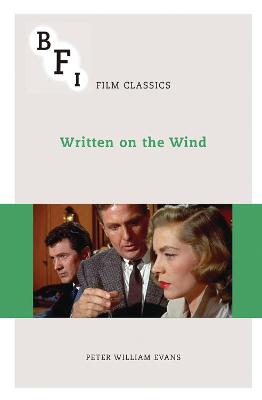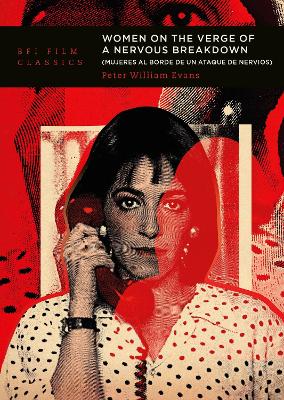BFI Film Classics
2 total works
Written on the Wind (1956) is one of classical Hollywood's most striking films and
ranks among Douglas Sirk's finest achievements. An intense melodrama about
an alcoholic playboy who marries the woman his best friend secretly loves,
the film is highly stylised, psychologically complex, and marked by Sirk's
characteristic charting of the social realities of 1950s America.
This first single study of Written on the Wind reassesses the film's artistic
heritage and place within the wider framework of contemporary American
culture. Incorporating original archival research, Peter William Evans examines
the production, promotion and reception of Written on the Wind, exploring its
themes – of time, memory, space, family, class and sex – as well as its brilliance
of form. Its vivid aesthetics, powerful performances and profound treatment
of human emotions, make Written on the Wind a masterpiece of Hollywood
melodrama.
ranks among Douglas Sirk's finest achievements. An intense melodrama about
an alcoholic playboy who marries the woman his best friend secretly loves,
the film is highly stylised, psychologically complex, and marked by Sirk's
characteristic charting of the social realities of 1950s America.
This first single study of Written on the Wind reassesses the film's artistic
heritage and place within the wider framework of contemporary American
culture. Incorporating original archival research, Peter William Evans examines
the production, promotion and reception of Written on the Wind, exploring its
themes – of time, memory, space, family, class and sex – as well as its brilliance
of form. Its vivid aesthetics, powerful performances and profound treatment
of human emotions, make Written on the Wind a masterpiece of Hollywood
melodrama.
Pedro Almodóvar’s 1988 black comedy-melodrama Women on the Verge of a Nervous Breakdown established its director as one of the most exciting of European film-making talents. An often hilarious study of sexual mores, Women on the Verge has a central character, Pepa (Carmen Maura), as warm and richly drawn as any modern film heroine. Made strong and self-reliant by suffering in a troubled relationship, Pepa is the centre of a network of lovers, friends and family who represent a vivid cross-section of Spanish society.
Peter William Evans provides a formidable analysis of Almodóvar’s insights into gender, sexuality and identity. Evans sees Women on the Verge as concerned with the often tyrannical spell of sexual desire and the anxieties of relationships and families, but also with the possibilities for personal liberation. He discusses the film in the context of the history of Spain and the social revolution that occurred after the death of Franco.
In his foreword to this new edition, Evans reflects upon Women on the Verge in the light of Almodóvar’s subsequent films, and the impact of Carmen Maura’s performance as Pepa on the representation of women in Spanish cinema.
Peter William Evans provides a formidable analysis of Almodóvar’s insights into gender, sexuality and identity. Evans sees Women on the Verge as concerned with the often tyrannical spell of sexual desire and the anxieties of relationships and families, but also with the possibilities for personal liberation. He discusses the film in the context of the history of Spain and the social revolution that occurred after the death of Franco.
In his foreword to this new edition, Evans reflects upon Women on the Verge in the light of Almodóvar’s subsequent films, and the impact of Carmen Maura’s performance as Pepa on the representation of women in Spanish cinema.

